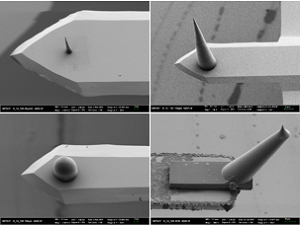Aug 11 2016
 Optimally adapted probes for atomic force microscopes can now be produced by 3-D nanoprinting at KIT. (CREDIT: Photos: KIT)
Optimally adapted probes for atomic force microscopes can now be produced by 3-D nanoprinting at KIT. (CREDIT: Photos: KIT)
The nanostructure of surfaces is made visible with atomic force microscopes. The probes of these microscopes use supreme quality measurement needles to scan the investigation material. These needles have now successfully been used by KIT for their applications.
An suitable measurement needle is produced for all types of measurement tasks, e.g. for various biological samples. 3D laser lithography - a 3D printer of structures in the nanometer size - is used for production.
The success of this has been featured in the title page of the Applied Physics Letters journal. DOI: 10.1063/1.4960386
Surfaces down to the atomic level are examined with the help of atomic force microscopes. However, the conventional probes that have been used for this particular purpose have not been ideal for all uses. A few examination objects need a specific shape or an extremely long probe to scan depressions of the material that are deep.
Recently, researchers from KIT have succeeded in developing probes that are optimally adapted to specific requirements.
Biological surfaces, such as the petals of tulips or roses, frequently have very deep structures with high hills.
Hendrik Hölscher, Head of the Scanning Probe Technologies Group, KIT
The physicist highlights that the probes that are commercially available are generally 15 micrometers, high, pyramid-shaped and relatively wide. Probes with varied shapes are provided, but they have to the manually developed, which increases their cost.
The KIT researchers have successfully used 3D laser lithography to develop tailored probes of varied shapes with a radius of just 25 nanometers, corresponding to 25 millionths of a millimeter. This process is ideal for designing and printing in three dimensions any desired shape and has been known for some time in the macroscopic area.
This approach is considered to be extremely complex at the nanoscale. The desired three-dimensional structures were obtained by the researchers through the usage of the 3D lithography process created by KIT and commercialized by Nanoscribe, which is an offshoot of KIT.
This process is based on two-photon polymerization, in which strongly focused laser pulses are used to harden light-sensitive materials after producing the desired structures. Next, the structures that are hardened are separated from the surrounding, non-exposed material.
In this way, the perfect probe can be produced for any sample to be studied.
Hendrik Hölscher, Head of the Scanning Probe Technologies Group, KIT
The journal Applied Physics Letters presents a report on the use of this process for improving atomic force microscopy. This report presented by the researchers is titled “Tailored probes for atomic force microscopy fabricated by two-photon polymerization”.
The probes that are capable of being developed in various shapes can be positioned on standard, commercially available measurement needles, and are barely subject to wear. They are ideal for studying biological samples, and also optical and technical components in the range of nanometers.
The study received financial aid from the German Research Foundation, a Starting Grant and a Senior Grant of the European Research Council (ERC), funds of the Alfried Krupp von Bohlen and Halbach Foundation, and the Federal Ministry of Education and Research under the PHOIBOS project. In addition, the research was supported by the “Karlsruhe Nano-Micro Facility” (KNMF) of KIT.
Probes for atomic force microscopy fabricated by two-photon polymerization were tailored by Gerald Göring, Philipp-Immanuel Dietrich, Matthias Blaicher, Swati Sharma, Jan G. Korvink, Thomas Schimmel, Christian Koos, and Hendrik Hölscher. Applied Physics Letters. DOI 10.1063/1.4960386.